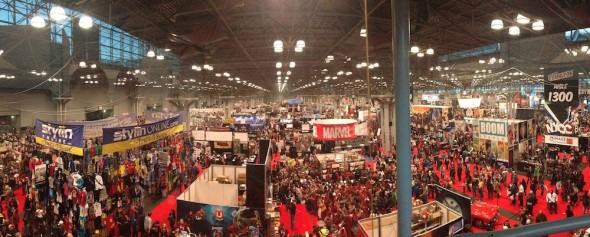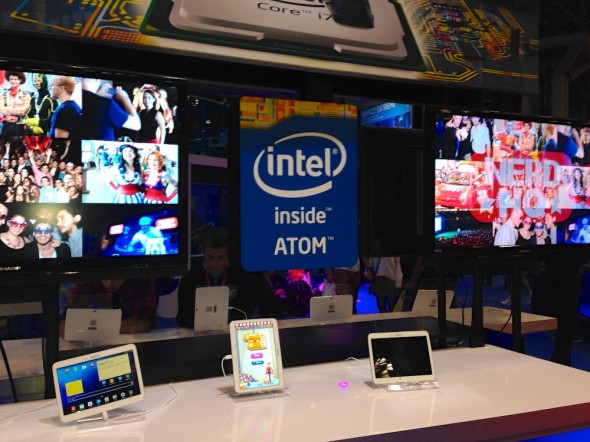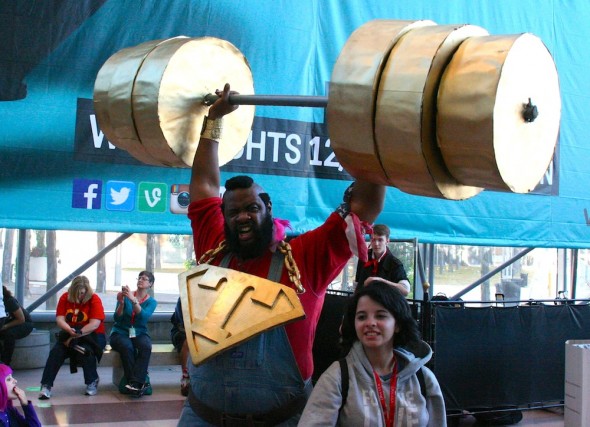Matt Belinkie and Mark Lee attended New York Comic-Con 2013 and had a lot of thoughts on the tension between the fan-driven and business-driven aspects of the event.
Matt
So Mark, I was a block away from the Javits Center when I passed an accordion player wearing a Boba Fett mask, playing Jonathan Coulton’s “Still Alive” from Portal.

On the one hand, this was awesome. But on the other hand, isn’t this guy just exploiting two major nerd touchstones to make some cash, playing his target demo like so many buttons on his accordion? Was it a celebration of fandom or cynical exploitation?
Mark
Well, can’t it be both? This guy could be an actual Star Wars/Portal fan, and he could also be here to leech money off the nerds. Likewise, I consider New York Comic Con to be both an earnest celebration of fandom and a cynical cash grab at the same time. I mean, if one accordion player can contain multitudes, a convention that’s comprised of competing business and fan interests certainly can too.
Matt
I find myself worrying about the Con becoming commercialized, even though that’s obviously silly. Comic Con only exists because a company makes money organizing it, and every single one of those booths on the floor is there to sell something. Nobody is signing autographs for free. The whole thing is a giant machine that converts love into money.

Mark
Yeah, that’s a totally fair point. Corporations have become frighteningly efficient at exploiting any opportunity to market themselves. And maybe it’s a little sad to see that at Comic Con, which has its roots as a simpler, fan-driven event that had far less money at stake. (Side note: San Diego Comic Con is operated by a non-profit entity; New York Comic Con is part of a for-profit enterprise.) The reality, though, is that our mythmaking, our storytelling, our proverbial campfire has been subsumed into massive corporate efforts to maximize their shareholders’ value, the Marvel-Disney-Star Wars juggernaut being the chief example of this.
Maybe the thing to do isn’t to be upset at this state of affairs but figure out how to work within it and how to find celebrations of culture that are less tainted by corporate greed.
Matt
Mark, you were recently at a Ren Faire, right? Am I correct to throw the “e” at the end of that?
Mark
‘Tis correct, m’lord.

Matt
Anyway, my impression of Ren Faires is that they aren’t about the money. Sure, people are selling crafts and axes, but HBO isn’t there promoting Game of Thrones, right? Comic Con is a little different. On one level, they are driven by the folks who spend months building that Megaman costume and can’t wait to show it off. But on another level, they are all about promoting TV shows and other “properties.” Maybe that’s only natural, since Comic Cons are all about pop culture. It’s one of the few places where advertising really is a symbiotic thing.
Mark
Actually, Big Chain Mail is juicing Ren Faires for billions of dollars in profit each year. I’m kidding, of course. I don’t know how big of a business Ren Faires are, but I know for sure that an HBO booth would be totally off limits and antithetical to a Ren Faire. Ren Faires have a whole thing with historical authenticity—or at least anachronism—that prevents the crassest forms of commercialism, which is a good thing, I think. So while a Comic Con and a Ren Faire may appear to be similar in that they’re a safe space for indulgence in fantasy, they are actually fundamentally quite different.
Matt
Okay, obviously Comic Con and commercialization go hand in hand. But maybe what I’m getting at is that there are different KINDS of commercialization. The parts of Comic Con I like the most are the booths where people are trying to sell a labor of love, like a comic book they spent years drawing or a battle axe they designed themselves. The parts of Comic Con I like the least are the giant booths for Chrysler, Intel, etc. They’re trying to sell something, but it’s not something the spokesperson running the booth loves or even cares about. They’re just ads.

Mark
You mean like the things that appear above and beside this article, the things that, in part, pay for this site? Aren’t Overthinking It and Comic Con just two points at different ends of the same spectrum? In a way, we’re both celebrations of pop culture that have to pay the piper to enable our respective fan communities. (In a way.)
I guess at the end of the day, I’m more willing to excuse the blatant commercialism of Comic Con than you are. It’s probably impossible to execute something at this scale in a purer way, and I’m willing to accept that as an acceptable cost for allowing, well, this to happen:

While I have the same sense of concern about commercialization of fandom, on reflection it seems bizarre to complain that events which essentially are celebrating corporate brands are getting “commercial”. Pop culture fandom is at its core focused corporate intellectual property — there are very few public domain or “open source” pop culture figures that get celebrated at these events. (This, more than anything may be the critical distinction between Ren Faires and events like Comic Con.)
Worrying about commercialization at Comic Con is a bit like having a convention that celebrates fast food, with people dressing up like Chicken McNuggets and the Hamburgler, and then complaining about the huge McDonalds booth.
There can be a middle ground, I think. I’ve been to some great, moderately-sized conventions that are non-profit and run by fans, and the cosplay is ridiculously good (yes, Mr. T-level good). Lots of commerce goes on at these cons, but it’s more for small businessfolks selling homemade steampunk petticoats and homemade T-shirts than it is about megacorporations. You can certainly argue there’s no real difference between these two kinds of sellers, just as you can argue there’s no real difference between the small farmer at your local farmers market and, say, Monsanto. So, I don’t know.
On an off-topic note, I find it slightly amusing that nerds are so willing to financially support megacorporations that could be the villains in a sci-fi universe. It’s like, “Grr, Weyland-Yutani. Yay, Microsoft!”
“Lots of commerce goes on at these cons, but it’s more for small businessfolks”
Technically that may be true, Shana, but you still have attendees walking around willingly promoting the brands of giant entertainment corporations. That’s not necessarily a bad thing, but I think it requires a bit of cognitive dissonance to say “Support indie creatives! Down with corporate cons!” when walking around in a costume of a Marvel or DC character. If one’s wearing the intellectual property of a billion-dollar corporation, perhaps one shouldn’t throw stones.
That said, fans do have a feeling of ownership of these corporately-produced characters which I think provides this kind of distancing, so the ire at megacorp presence at cons is kinda understandable. (I think there’s also a sense of the remix culture here, that applying the notion of “ownership” to any popular cultural product is problematic.)
Good points, and I have nothing more to add to this conversation! :)
I think the different types of cons can be paralleled with different types of cosplayers. I’ve encountered multiple types in person at cons (and you can view these yourselves by watching that _Heroes of Cosplay_ on SyFy), cosplayers ranging from, on one end of the spectrum, people that have been fans of a certain show, series, film, etc. for years and put all sorts of blood, sweat, tears, and every red cent into their costumes; on the other end, people that have their own corporate sponsorship and just pick something that looks (sometimes literally) flashy enough to win, people that outsource at least some of the construction to others and do more visionary/nitpicky supervision than actual hands-on work. Both are cosplayers, and both get put in the same competitions, yet one could argue they’re exceptionally different.
I guess one could then say, “Vote with your feet,” and insist a person only go to the ones more, um, I dunno, more in-lone with their personal code of ethics. But life is more complicated than that, and I wouldn’t think less of anyone going to a huge con. I think it comes down to what you do when there. Sure, someone makes money off of that picture you pay to get signed, but we’re stuck in a capitalistic society that makes it basically impossible for that picture to get signed without *some* monetary exchange.
Overcommercializing and incorrectly commercializing are distinct. Allowing stuff that’s off theme is definitely an example of the latter, as it dilutes the convention’s focus, quality, and brand.
Woah. Guys. Conventions are a cog in the wheel of our great capitalist machine. It down and dirty, raw exchange of money not for just love- but for talent and entertainment!
Boba Fett playing the accordion is there because sure, he likes to get paid- but he’s getting paid because people friggin’ love seeing him! He’s not exploiting nerds, he’s catering to them. And also- that guy has been at NYCC for years, and virtually nowhere else. He learns new music and practices his accordion and works hard for this show. Let’s not nerd test him, huh?
Sometimes it seems like nerds are so protective of our little corner of the hobby universe that we are constantly over-thinking and over-vetting everything and everybody.
People make nerd art because they love it, and if they get paid for it that means they can do it a lot and make a lot more of it for the joy of fans everywhere. If business are making appearances at a Con that really shouldn’t be at, they won’t make any money and they won’t come back. It a self-fixing problem.
Comics readership is down. Making people or companies pass some sort of test to come into that kind of marketplace is just shoot us as comic book fans in the foot. Less money in the industry means less product, and more people who like gaming (or starwars or whatever) getting introduced into comics is more better.